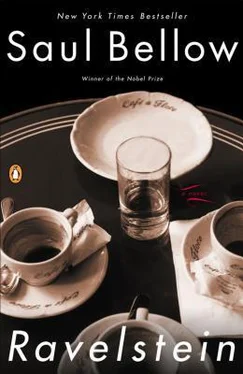God appeared very early to me. His hair was parted down the middle. I understood that we were related because he had made Adam in his own image, breathed life into him. My eldest brother also combed his hair in the same style. Between the senior brother and me there was another brother. Senior to all of us was our sister. Anyway… this was the world. I had never seen it before. Its first gift was the gift of itself. Objects gathered you to themselves and held you by a magnetic imperative that was simply there. It was a privilege to be permitted to see-to see, touch, hear. This would not have been impossible to describe to Ravelstein. But he would have answered dismissively that Rousseau had already covered the same turf in his _Confessions__ or his _Reveries of a Solitary Walker__. I didn't feel like having these first epistemological impressions anticipated or dismissed. For seventy-odd years I had seen reality under these same signs. I had the feeling, too, that I had to wait for thousands of years to see, hear, smell, and touch these mysterious phenomena-to take my turn in life before disappearing again when my time was up. I might have said to Ravelstein, "It was my one turn to live." But he was too close to death to be spoken to in such terms and I had to surrender my wish to make myself fully known to him by describing my intimate metaphysics. Only a small number of special souls have ever found a way to receive such revelations.
Further childish penetrations of the external world: On Roy Street in Montreal a dray horse has fallen down on the icy pavement. The air is as dark as a gray coat-lining. A smaller animal might have found its feet, but this beast with its huge haunches could only work his hoofs in the air. The long-haired Percheron with startled eyes and staring veins will need a giant to save him, but on the corner a crowd of small men can only call out suggestions. They tell the cop he's lucky the horse fell on Roy Street, easier to write in his report than Lagauchettierre. Then there is a strange and endless procession of schoolgirls marching by twos in black uniform dresses. Their faces white enough to be tubercular. The nuns who oversee them keep their hands warm within their sleeves. The puddles in this dirt street are deep and carry a skim of ice.
In children this impression-real reality-is tolerated by adults. Up to a certain age nothing can be done about it. In well-to-do families it lasts longer, perhaps. But Ravelstein might have argued that there was a danger of self-indulgence in it. Either you continue to live in epiphanies or you shake them off and take up trades and tasks, you adopt rational principles and concern yourself with society, or politics. Then the sense of having come from "elsewhere" vanishes. In Platonic theory all you know is recollected from an earlier existence elsewhere. In my case, Ravelstein's opinion was that distinctiveness of observation had gone much further than it should and was being cultivated for its own strange sake. Mankind had first claim on our attention and I indulged my "personal meta physics" too much, he thought. His severity did me good. I didn't have it in me at my time of life to change, but it was an excellent thing, I thought, to have my faults and failings pointed out by someone who cared about me. I had no intention, however, of removing, by critical surgery, the metaphysical lenses I was born with.
This is one of the traps that a liberal society sets for us-it keeps us childish. Abe would probably have said, "It's up to you to make a choice. Either you continue to see as a child, or else."
So once again Ravelstein was recovering from still another sickness and learning for what seemed the tenth time how to sit up. Nikki learned to operate the triangle-lift, and when Ravelstein began to improve Rosamund and I followed Nikki as he guided the wheelchair. Ravelstein with his eyes half shut dropped his head to one side. With Nikki pushing he rolled through the large apartment-meant for happier, more normal souls. But this was his kingdom, with all its possessions.
Rosamund, with tears in her eyes, asked me whether he would ever be himself again.
"Can he fight off the Guillain-Barrй? I'd say the odds are on his side," I said. "Last year, he had the shingles-herpes something-or-other. He fought those shingles off. That one, he won."
"But how many times can you do that?"
"Everything is just as you left it," Nikki was saying to Ravelstein.
The carpets and hangings, Lalique fixtures, pictures, books, and compact discs. He had sold his collection of old phonograph records, a large and choice one, to keep pace with technological advances. He had CD catalogues arriving from London, Paris, Prague, and Moscow offering the latest Baroque recordings. The telephones of what Nikki and I called the "command post" were disconnected. Only the instrument in Nikki's bedroom was, as he said, "operational." In this city of millions there couldn't have been another apartment like this one-with priceless antique carpets everywhere and, on the kitchen sink, a hissing espresso machine of commercial size. But Ravelstein could no longer operate it. Over the mantelpiece Judith was still holding the head of Holofernes by the hair. His mouth open. Her eyes turned to heaven. The painter wanted you to think of Judith as the simple daughter of Zion, a natural chaste beauty, even though she has just cut off a fellow's head. What was Ravelstein's view of all this? There were very few indications in his private quarters of Ravelstein's sexual preferences. One had no reason, in any respect, to suspect him of irregularities of the commoner sort-the outlandish seductive behaviors of old-fashioned gay men. He couldn't bear the fluttering of effeminate men.
On these wheelchair tours of his apartment what he was feeling was stingingly apparent: What will happen to all this when I am gone? There's nothing that I can take with me into the grave. These beautiful objects which I bought in Japan, in Europe, and New York, far and wide, with so many deliberations and discussions with experts and friends…. Yes, Ravelstein was going down. You might not have guessed, seeing him in his rolling chair, tucked into the plaid with a wide stooped back and the honeydew-melon head tipped far to the side, how physically impressive he was, and how little his quirks, tics, and idiosyncrasies, and recent infections counted. Years ago, visiting my country house in New Hampshire, Ravelstein asked whether I had any proprietary feeling for the fieldstone house, the old maples and hickory trees, the gardens. The truthful answer was that though I liked them all well enough, I did not identify myself as the owner of these acres and objects. So that if the worst were to happen and a local armed militia were to descend on me and drive me out as a Jewish alien, their offense mainly would be against the Jew, not against the landowner. And in such a case my concern would be for the U. S. Constitution, not for my investment. The rooms, the rocks, the vegetation had no hold on my vital organs. If I were to lose it, I'd live on elsewhere. But if the Constitution, the legal foundation of it all, were to be destroyed, we would return to the primal chaos, he used to warn me.
On that visit, Ravelstein had come down to see me from Hanover on Interstate 91, risking his life in a rented car. He was far too un coordinated to be safe on the highways-he jittered at the wheel. He had no connection with vehicles except as a passenger, and was too nervous. And he disliked the country.
He said, repeating the opinion of Socrates in the _Phaedrus__, that a tree, so beautiful to look at, never spoke a word and that conversation was possible only in the city, between men. Because he loved to talk, to think while talking, to lean backward while the bath of ideas overflowed-he instructed, examined, debated, put down errors, celebrated first principles, mixing his Greek with a running translation and stammering madly, laughing as he embroidered his expositions with Jewish jokes.
Читать дальше












